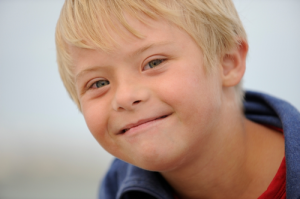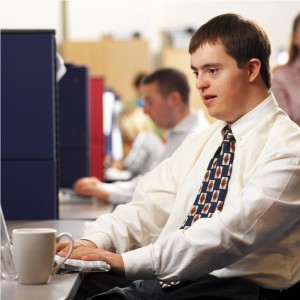
October is Down Syndrome awareness month and Foundation 21, SA's support organisation for people with Down Syndrome hold their annual Buddy Walk on Sunday 20th October. Most people have heard of Down Syndrome but perhaps don't know much about it. Children and adults with Down Syndrome have their own individual strengths, characteristics and personality but also share some common challenges.
Down Syndrome is a genetic condition in which the person has an extra copy of chromosome 21. This additional chromosome results in a number of physical and developmental characteristics and some level of intellectual disability.
Down Syndrome is usually recognisable at birth and is confirmed by a blood test. Prenatal tests are also available. Down Syndrome is the most common chromosome disorder and occurs in all races and cultures at around the same rate. Some level of intellectual disability is the only feature common to all people who have Down Syndrome, although a range of other features are also associated with the condition. These include characteristic physical features and a number of health and developmental indications.
There are a number of common physical characteristics associated with Down Syndrome, although each person with Down Syndrome may only display a few. While children with Down Syndrome share some of the same characteristics and may look alike, each child is different and will also look like their parents and family. The most common physical characteristics include:
- Eyes that have a slight upward slant and an extra fold of skin on the inner side.
- Small white patches on the edge of the iris of the eye.
- An often rounded face with a small, flatter nose.
- A single crease across the palm of the hand.
- A smaller stature. Babies with Down Syndrome usually weigh less and are smaller at birth. Children with Down Syndrome tend to grow slower and are commonly smaller than other children their age.
- Low muscle tone and loose ligaments (especially in the hips).
Whilst some children with Down Syndrome have no significant health problems, others may experiences a range of medical issues that require extra care, which can include:
- Congenital heart defects.
- Thyroid problems.
- Intestinal abnormalities.
- Seizure disorders.
- An increased susceptibility to infection.
- An increased risk of developing pulmonary hypertension, which is a serious condition that can lead to irreversible damage to the lungs.
- Hearing difficulties. Hearing loss can be related to fluid build-up in the inner ear or to structural problems within the ear itself.
- Vision problems commonly include long or short sightedness, an increased risk of cataracts and cross-eyedness.
There are significant speech and language difficulties associated with Down Syndrome, areas affected include:
Articulation: Children with Down Syndrome are usually delayed learning to communicate. A major characteristic is that their speech is usually difficult to understand, possibly due to structural differences and low muscle tone. Children with Down Syndrome will often have a large, protruding tongue which may seem bigger due to the accompanying small mouth opening and small chin. The restricted tongue movement within their small mouth affects their articulation.
Voice: A breathy, husky voice with a low pitch and also hyper nasality with nasal air emissions may be heard. These voice problems may result from the generalised low muscle tone and structural differences in the head and neck region.
Language: Both receptive (understanding) and expressive (use of) language skills may be significantly impaired, however expressive language is reported to be more affected than receptive language. The comprehension difficulties are further complicated by poor verbal short-term memory skills. A child with Down Syndrome’s first true word may be delayed as late as 24 months, with continued delays in the onset of multi-word utterances and grammatical development.
Social skills: People with Down Syndrome are often observed to have an affectionate nature and social skills can be a strength. Sometimes a very affectionate nature can cause difficulties in interacting with others appropriately.

Children with Down Syndrome can and do learn, and are capable of developing skills throughout their lives. They simply reach goals at a different pace, which is why it is important to not compare a child with Down Syndrome with a typically developing child or even other children with Down Syndrome. Children with Down Syndrome have a wide range of abilities, and there is no way to tell at birth what they will be capable of when they grow up.
Common questions What kind of treatment is available? There is no cure for Down Syndrome and no effective medical treatments at the present time. However, because of conditions common to those with Down Syndrome medical and supportive care is essential to those affected.
What kind of support does my child need? Support needs vary from child to child so each child should be individually assessed to determine what is most important for them. Many children benefit from speech pathology for communication skills, occupational therapy for fine motor and sensory issues and psychology for behavioural issues. Talking Matters provides speech pathology, psychology and occupational therapy services for children with Down Syndrome. We have a range of funding options available to help with the cost of therapy and are providers under the federal governments Betterstart and Disability Care Australia programs.
Will my child grow out of it? Down Syndrome is a genetic condition so people do not grow out of it. They do however learn and develop, their needs and abilities change over time and with support many people with Down Syndrome lead full and happy lives. Support in adulthood may vary from being fully dependant to needing just a little support with relationships. The more support children receive when they are younger the better they will do when they are older.
Talking Matters provides speech pathology and occupational therapy services to children of all ages. To find out more about our speech pathology services click here. To find out more about occupational therapy click here. To find out more about Talking Matters visit us on our website, Facebook page, Twitter, or Pinterest.
Related posts:
Body awareness
Occupational therapy
Toothbrushing
Getting dressed
Toilet training
Sleep
Active communicators
Baby play
Learning with music
Communicating choices
Developing vocabulary
Developing concepts
Developing play
Developing first words
Beginning questions
Related Blog Posts
If you liked this post you may also like:
New Talking Matters Website!
Speech pathology FAQ
Case Study - Casey's experience with TM's social & emotional group program
Playdough Letters



